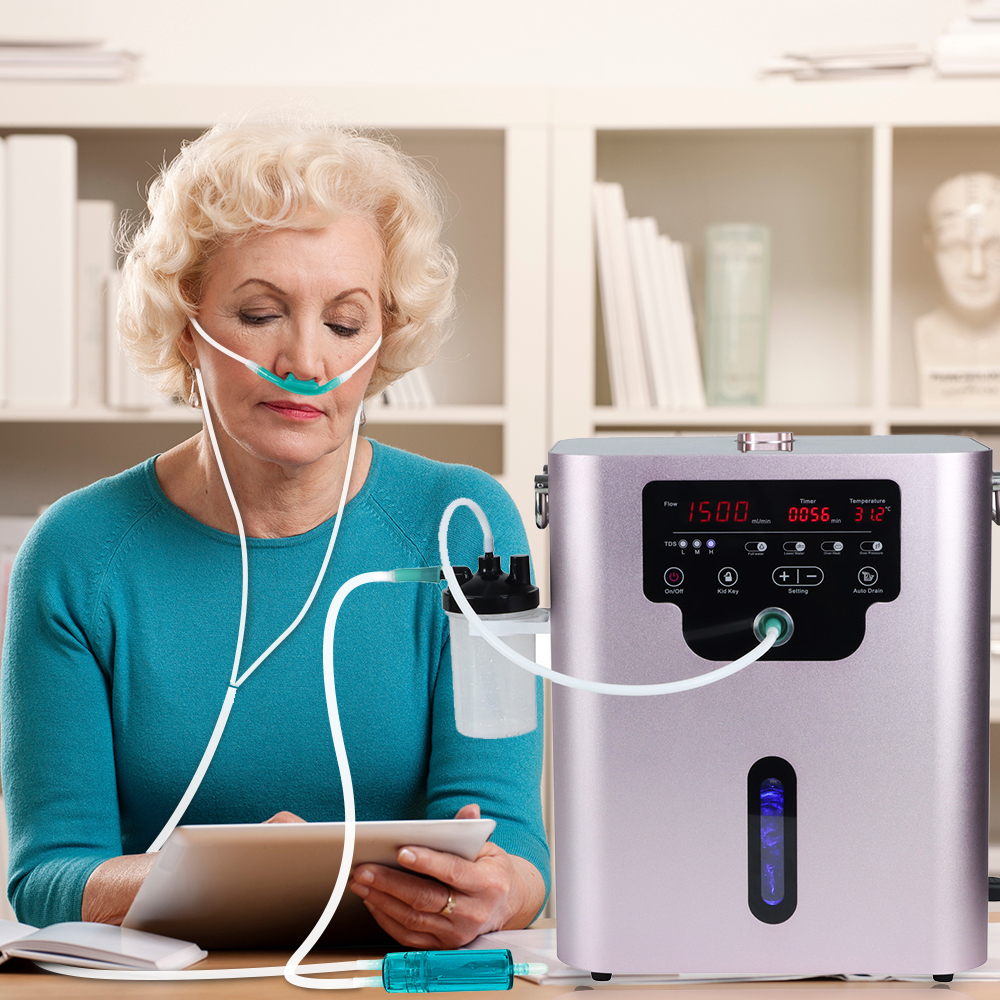Blog
Hydrogen Inhalation: Unveiling the Benefits of Hydrogen Machines
In recent years, hydrogen inhalation has emerged as a revolutionary health practice, and hydrogen machines, also known as hydrogen inhalers, are becoming increasingly popular.
Hydrogen has been found to have antioxidant properties. It can neutralize free radicals in the body, which are harmful molecules that can cause damage to cells and lead to various diseases. By reducing the presence of free radicals, hydrogen helps protect cells from oxidative stress. This is particularly beneficial for people with conditions like heart disease, diabetes, and neurodegenerative disorders.
Another significant advantage of hydrogen inhalation is its anti-inflammatory effects. Inflammation is the body’s natural response to injury or infection, but chronic inflammation can be harmful. Hydrogen can reduce inflammation by modulating the immune system, which helps the body heal more effectively and reduces the risk of chronic diseases.
For athletes, hydrogen inhalation can enhance performance and speed up recovery. It increases energy production in cells, allowing muscles to function more efficiently. This can lead to improved endurance and faster recovery after exercise.
Hydrogen machines are also easy to use. They provide a convenient way to inhale hydrogen, either through a mask or a nasal cannulas
Senior woman inhaling hydrogen gas. This makes it accessible for people of all ages and health condition.
Here are some research and statistical data on the benefits of hydrogen inhalation machines:
- Research on Disease Improvement
- Brain Ischemia: In 2007, Professor Ohta Shigeo’s research in Japan confirmed that inhaling 2% hydrogen gas can significantly improve cerebral ischemia-reperfusion injury in rats. In July 2017, Professor Hirohisa Ono from Juntendo University published a clinical study showing that hydrogen inhalation has a significant effect on brain tissue recovery, neurological function improvement, and quality of life in acute cerebral ischemia patients. Population studies have proven that hydrogen inhalation as an adjunctive method can reduce the death risk of cerebral ischemia.
- Alzheimer’s Disease: According to the World Health Organization, there are approximately 50 million dementia patients globally, with nearly 10 million new cases each year. Animal studies have shown that hydrogen inhalation (using hydrogen-oxygen machines or hydrogen inhalation machines) has a therapeutic effect on Alzheimer’s disease, and there is also case evidence of symptom relief in dementia patients through hydrogen inhalation. A study by the famous Serbian hydrogen medicine scholar Sergej Ostojic on the improvement of cognitive function in the elderly by hydrogen inhalation showed that hydrogen inhalation can improve the cognitive ability of the elderly and has an intervention value for elderly cognitive impairment.
- Respiratory System Diseases: A study on sanitation workers in Shijiazhuang City, a city severely polluted by haze in Hebei Province, in winter preliminarily confirmed that hydrogen can relieve respiratory tract inflammation caused by haze. A study on “Protective Effect of High-Concentration Hydrogen Inhalation on Chronic Obstructive Pulmonary Disease in Rats” showed that inhaling high-concentration hydrogen can improve emphysema, chronic bronchitis, small airway remodeling, and pulmonary function decline in mice caused by smoking.
- Tumors: Multiple studies have found that hydrogen inhalation can reduce the side effects of tumor radiotherapy and chemotherapy, and long-term hydrogen inhalation can inhibit the proliferation and metastasis of tumor cells.
- Research and Statistical Data on Other Health Care Benefits
- Antioxidant and Anti-Inflammatory: Hydrogen can combine with free radicals in the body and is an ideal antioxidant. It can neutralize and remove malignant free radicals in the human body and inhibit the inflammatory response, alleviating symptoms and damage in inflamed areas.
- Enhanced Mental State: Hydrogen has the effect of regulating the nervous system, which can relieve tension and resist depression, enhancing the mental state.
- Immune Enhancement: Hydrogen can eliminate free radicals in the body, reduce the damage of oxidative stress to the body, thereby enhancing immunity. Long-term use is also helpful in delaying aging and maintaining a youthful physical state.
- Statistical Data on the Efficacy of Hydrogen Inhalation in Specific Diseases
- Type 2 Diabetes: A 6-month retrospective, multicenter, observational clinical study on Chinese patients with type 2 diabetes mellitus found that hydrogen inhalation therapy significantly improved glycemic control, weight, insulin dose, lipid metabolism, β-cell function, and insulin resistance in patients. The glycated hemoglobin (HbA1c) level decreased from 9.04 ± 0.82% at baseline to 8.30 ± 0.99% and 8.00 ± 0.80% at the end (p < 0.001), fasting plasma glucose (FPG) decreased from 165.6 ± 40.2 mg/dl at baseline to 157.1 ± 36.3 mg/dl and 143.6 ± 32.3 mg/dl at the end (p < 0.001), and weight decreased from 74.7 ± 7.1 kg at baseline to 73.6 ± 8.1 kg at the end (p < 0.001).
In conclusion, hydrogen machines offer a range of benefits that make them a valuable addition to our health routine. Whether you’re looking to improve your overall health, manage a specific condition, or enhance your athletic performance, hydrogen inhalation could be a great choice.
If you’ve ever tried hydrogen machines, share your experiences in the comments below. Do you think hydrogen inhalation has made a difference in your life?

